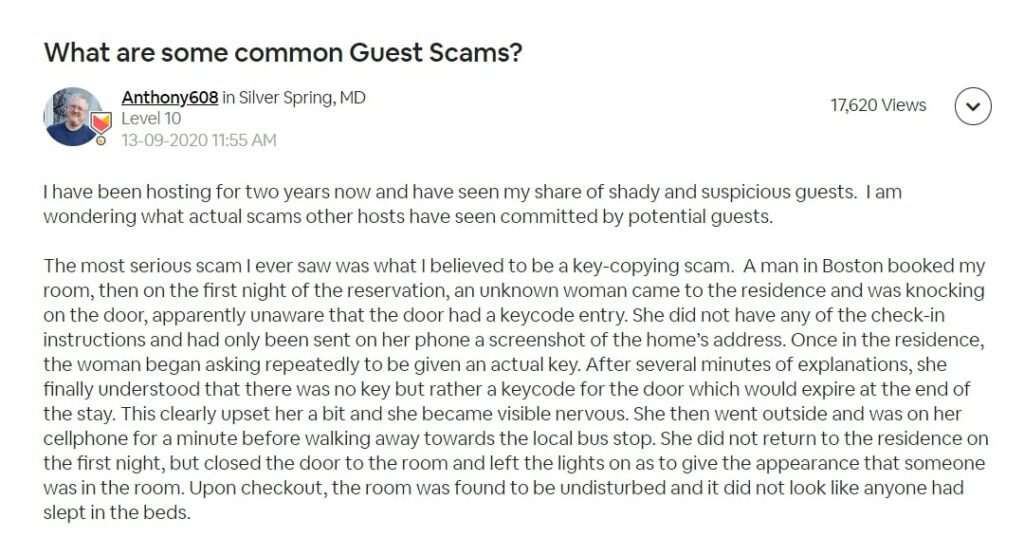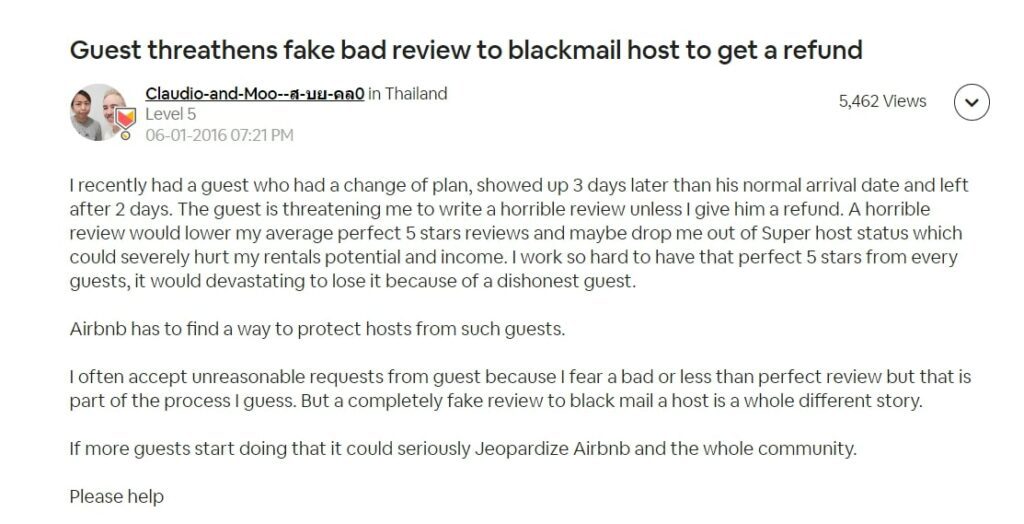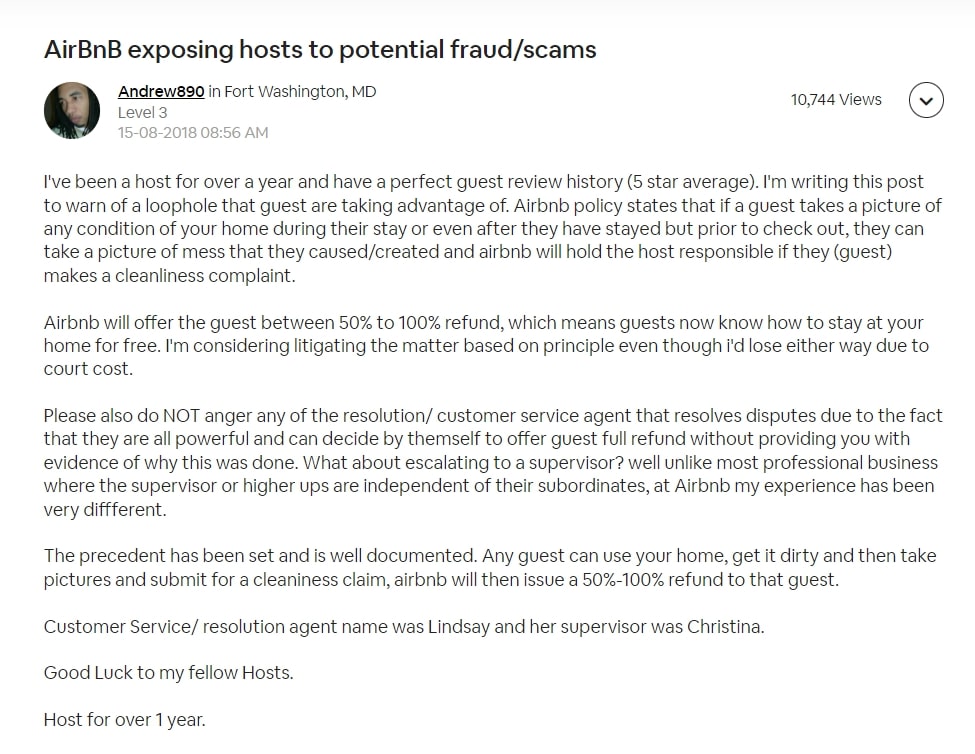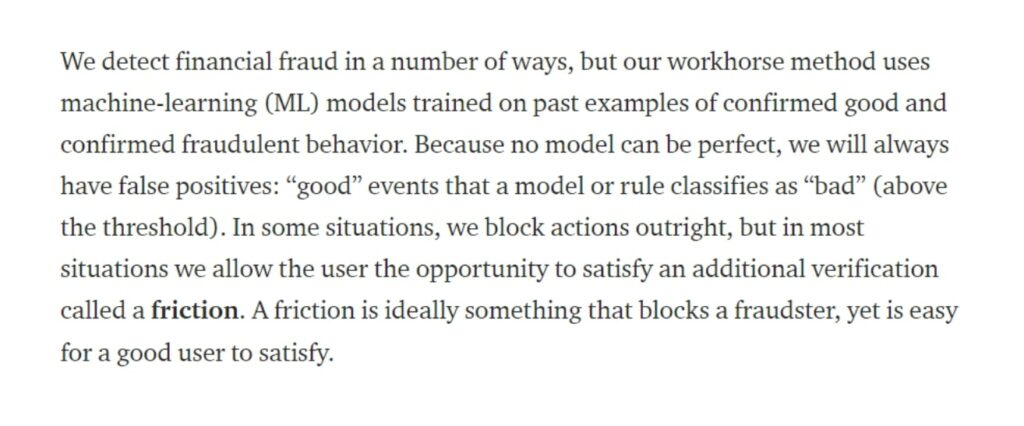Smart management solutions can help you avoid costly guest fraud. Not sure where you should turn?
Operto is your trusted ally for creating better guest and host experiences while keeping your business protected.
Streamline Guest Access
Simplify tasks and housekeeping
Boost Guest Experience
By property type
By business goal
CHAPTER 8
With the right techniques, you can protect your properties and combat guest fraud
Listen to this chapter on SoundCloud.
You receive reports of a murky smell, poor hygiene, hair and dust lying everywhere, and even giant roaches roaming around. You know that’s impossible. Your cleaning team is impeccable and trustworthy. It’s not long before you realize you’re dealing with a fraudster.
Believe it or not, this is a true story from around two years ago. The scammer wanted to extort money and settle the case outside of the Airbnb platform. The owner refused to be blackmailed this way and in return got a very nasty online review. This is just one of many guest fraud examples.
Property managers and vacation rental operators are naturally inclined to be hospitable and assume good intentions because it’s good for the business and in our nature to be trusting. Unfortunately, fraudsters have other things on their agenda. In a tight market, when margins are thin, the last thing you want to deal with is guest fraud.
To help you avoid being a victim, we list the most common problems, real-life examples, and practical solutions, so you can mitigate the risk of short-term rental guest fraud.
Read other chapters in The Reservation Recession.
Smart management solutions can help you avoid costly guest fraud. Not sure where you should turn?
Operto is your trusted ally for creating better guest and host experiences while keeping your business protected.
Key copying is a serious problem and a worrying potential security breach for any property manager out there. It often follows fraudulent bookings, i.e. scammers booking a stay without the intention of ever being your guest. This way they get access to check-in information and learn the actual address of your property. Once they get a hold of your keys, they can duplicate them which makes your property vulnerable to criminal activity.
Here’s one example of an attempt of a key-copying scam that fortunately created no serious consequences:

As you can see from the example above, keycodes that expire at the end of the stay provide an additional layer of security—both for your guests and your vacation rental. Keyless entry prevents scammers from entering your listings by using stolen or duplicated keys.
Pro tip: Use keyless access for maximum security, but make sure that codes are reset after every stay. Generate unique access codes every time and share it only with verified guests. |
Operto Tech connects your smart locks with your PMS so every time there’s a new booking, there’s a new access code, too. Having a unique access code eliminates the need for key cards.
The best part is that you get a log of everyone who’s ever entered the property. Seamless, easy, and beautiful. Want to learn more? Book a demo for Operto Tech. |
In the hospitality industry, blackmailing is a common type of scam where a guest threatens to damage your online reputation in the knowledge that guest reviews often play a crucial role in your occupancy rates.
In most blackmailing cases, guests ask for a refund or a certain amount of money, threatening to leave a bad review online if you refuse. Below you can see one example of this type of fraud:

This host makes a really good point about the importance of guest screening for Airbnb hosts. Airbnb has made significant steps toward fraud prevention (e.g. verifying a guest’s identity by requiring a scan of a personal document), but cases of fraud still continue.
Implement an automated screening process where personal data and contact information are utilized to cross-check guests with regional, federal, and international records, giving you more control over who stays at your short-term rental.
Pro tip: Most OTAs and travel websites such as TripAdvisor encourage property managers, hoteliers, and vacation rental operators to report blackmail threats immediately to get ahead of fraudsters and protect your online reputation. Also, make sure you know your rights and read through the policies on OTA websites (e.g. Airbnb Extortion Policy). |
Unfortunately, in many disputes you might have with your guests, it’s their word against yours.
Scammers are aware of the flaws of OTA systems and other marketplaces. Cleanliness is one of the important factors that guests can comment on online or leave a separate review for. So, despite the fact you invest in keeping the place spotless, some guests might try to scam you by falsely representing the state of your accommodation. They can then attempt to get a partial refund or even stay at your short-term rental for free.
Below you can read about one unfortunate case of a five-star Airbnb host who stumbled upon a scammer:

There’s a smart way to prevent the inconvenient “he-said-she-said” situation from happening. To avoid guest fraud, log the condition of your properties after each clean.
Operto Teams users do this on a daily basis. It’s easy to create a task for cleaners to share pictures of the property within the Staff Portal. That way, if guests try to scam you, you have photo evidence with timestamps readily available.
Pro tip: Make sure your cleaning team understands why you’re collecting photo documentation of each unit. Otherwise they might think you are micromanaging or that you don’t trust them. Use a software solution for your internal communications that makes storing and maintaining records easy for your staff. See how easy it is to record the condition of units with an Operto Teams demo |
Your guests have checked out. Everything seems alright. Your cleaning team is already preparing the place for your next guests. Then out of nowhere, you receive a notification from your bank that the payment has been reversed.
Chargeback fraud is an especially tricky type of fraud. A chargeback is the reversal of a credit card payment that’s issued directly by the user’s bank. In the case of refunds, the retailer is directly involved. But with chargebacks, the customer bypasses the retailer and there’s little you can do about it.
In the hospitality industry, there are two common cases where a chargeback might occur:
Payment fraud is tough to deal with. You can file a request for dispute resolution, but it will be costly if your case is unsuccessful. So, largely, scammers count on vacation rental operators not bothering and simply taking the hit.
Meanwhile, Airbnb’s Trust and Data Science team actually relies on complex machine learning models to fight fraudulent chargebacks, as David Press, Trust Data Scientist at Airbnb explains in his Medium article:

If you introduce a digital front desk, not only will you equip your guests with all the necessary information upfront (e.g. by enabling them access to digital guidebooks, entry codes, and WiFi passwords), but you’ll also have sufficient proof of the fraudster interacting with your short-term rental business.
Every bit of proof you have is valuable, especially confirmation of them booking a stay. Think about safely storing the scans of their IDs, their digital signature, access logs, and more. If a dispute occurs, this will help you build a case for your business.
Pro tip: Use trustworthy and secure tech solutions that will ensure a seamless guest experience but also help you safely store guest records in case you need to prove a case of payment fraud. Be armed with information and evidence, just in case. |
To keep your short-term rental business safe, you should always think two steps ahead, implementing automated processes and practices that protect you from bad actors, and track the state of your units as well as your booking information and guest interactions.
Guest screening needs to be frictionless for your guests. If they sense you’re being intrusive, it can negatively impact your relationship with them and may even trigger bad reviews. This is why you should consider an automated screening solution that’s built into the guest booking/check-in process.
For instance, with Operto Guest, guests can easily provide basic ID details to get verified and screened by automated guest screening experts, Autohost. Because the entire experience is seamless, your guests will perceive it as a part of your standard guest booking procedure.
Operto Guest enables you to focus on building meaningful relationships with your guests within a branded web app that automates check-in, guest verification, and guest screening.
There are pros and cons to requesting a security deposit.
Security deposits might put off some guests and the protection they offer is limited, plus there’s a process around receiving and returning them. That said, with a security deposit in place, you’ll have some protection against property damage with a fast way to collect the funds for repairs if needed.
An insurance policy that’s specific to your business can help you handle damage to your belongings and property, and even protect you and your guests in the case of a serious injury occurring during a stay. But don’t only look at what’s covered as part of your plan, also see that the claims process is simple and payouts are fast.
Stolen credit card information is a common cybersecurity issue, and the hospitality industry often struggles to effectively deal with it. However, if you’re using a trusted PMS solution, you shouldn’t have too much to worry about because it’s their job to prevent any unauthorized access or hacker attacks.
Being proactive about guest fraud can save you a lot of stress and money. Combine seamless tech solutions that easily integrate with your PMS and guest experience tools to achieve multiple business goals. More precisely, you can:
Operto Tech ensures improved security by assigning unique access codes for each individual booking.
Use our digital check-in system to minimize the chance of becoming a victim of fraud, and provide the best guest experience.
Hospitality fraud is a term used to describe different types of illegal activities that target hotels, vacation rentals, short-term rentals, and more. Common examples include credit card or chargeback fraud, identity theft, fraudulent bookings, and guest blackmailing. Severe cases might include cyber attacks, where hackers take advantage of weak security patches to steal guest information and credit cards.
Whether or not Airbnb will refund you if you are scammed depends on each specific case. Airbnb has policies such as Host damage protection (a part of AirCover for Hosts) and the Extortion Policy in place, but scammers still manage to find loopholes to get away with fraudulent activities.
Unfortunately, Airbnb hosts can get scammed. However, you can mitigate the risk of being a victim by taking preventive measures. Here’s a list of things you can do:
| Cookie | Duration | Description |
|---|---|---|
| cookielawinfo-checbox-analytics | 11 months | This cookie is set by GDPR Cookie Consent plugin. The cookie is used to store the user consent for the cookies in the category "Analytics". |
| cookielawinfo-checbox-functional | 11 months | The cookie is set by GDPR cookie consent to record the user consent for the cookies in the category "Functional". |
| cookielawinfo-checbox-others | 11 months | This cookie is set by GDPR Cookie Consent plugin. The cookie is used to store the user consent for the cookies in the category "Other. |
| cookielawinfo-checkbox-necessary | 11 months | This cookie is set by GDPR Cookie Consent plugin. The cookies is used to store the user consent for the cookies in the category "Necessary". |
| cookielawinfo-checkbox-performance | 11 months | This cookie is set by GDPR Cookie Consent plugin. The cookie is used to store the user consent for the cookies in the category "Performance". |
| viewed_cookie_policy | 11 months | The cookie is set by the GDPR Cookie Consent plugin and is used to store whether or not user has consented to the use of cookies. It does not store any personal data. |